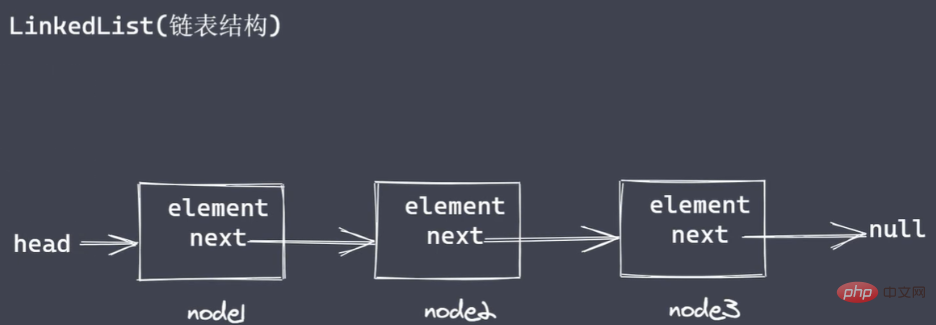Does node have a linked list structure?
There is a linked list structure in node; the linked list is a structure for storing data. When the file writable stream method works, some written content needs to be queued in the cache area and is first-in-first-out. According to the rules, in order to store these queued data, the new version of node uses a linked list structure to store these data.

The operating environment of this article: Windows 10 system, nodejs version 12.19.0, Dell G3 computer.
Node has a linked list structure
A linked list is a structure for storing data.
When the file writable stream write method is working, some written content needs to be queued in the buffer and follows the first-in, first-out rule.
In order to store these queued data, the new version of Node uses a linked list structure to store these data.
Why not use arrays to store data?
Compared with the linked list structure, arrays have some obvious disadvantages:
The length of arrays to store data has an upper limit in many languages
There is a collapse problem in arrays , when inserting or deleting elements, the position of other elements may be moved
In JavaScript, arrays are actually object types, which will be less efficient in use
The above disadvantages are just Compared with linked lists, array structures are still very powerful in actual use.
Linked list
A linked list is a collection composed of a series of nodes.
Each node has an attribute (next) that points to the next node reference.
Combining these references to the next node forms a chain.
Common linked list classification
Two-way linked list: the most commonly used, its query speed will be faster
One-way linked list: This example discusses one-way Linked list, it is enough for the write method of the writable stream to use
Circular linked list
One-way linked list structure

The linked list structure is actually a container , three objects are stored in it: head, null and the middle node node.
There is a next attribute on the node node, pointing to the next node node.
At the same time, the node node also has an element attribute, which is used to store the specific data of the current node node.
head points to the first node, and then passes down in the order pointed by next, until the last node, whose next points to null.
By default, the linked list is empty (head = null) and there is no node node in it.
The so-called doubly linked list is to add an attribute similar to prev to each node, pointing to the previous node.
The circular linked list connects the head and tail nodes.
The role of linked lists
The appearance of linked lists is mainly used to store data.
This function is similar to that of an array, so the common actions of a linked list are operations such as adding, deleting, modifying, querying, and clearing data.
These need to be implemented by yourself when creating the linked list structure.
One-way linked list implementation
Master the implementation of the one-way linked list structure to store the data that needs to be queued and written when the file is writable.
The linked list structure contains node, head, and null
The default linked list is empty, that is, head points to null
The operation of the linked list is similar to an array, so there must be an attribute record node Number: size
Each node must have an attribute pointing to the next data: next
The node itself also needs to store data, using an attribute to store: element
Use a linked list The behaviors of the structure generally include: add, delete, modify, query, clear
Recommended learning: "nodejs video tutorial"
The above is the detailed content of Does node have a linked list structure?. For more information, please follow other related articles on the PHP Chinese website!

Hot AI Tools

Undresser.AI Undress
AI-powered app for creating realistic nude photos

AI Clothes Remover
Online AI tool for removing clothes from photos.

Undress AI Tool
Undress images for free

Clothoff.io
AI clothes remover

Video Face Swap
Swap faces in any video effortlessly with our completely free AI face swap tool!

Hot Article

Hot Tools

Notepad++7.3.1
Easy-to-use and free code editor

SublimeText3 Chinese version
Chinese version, very easy to use

Zend Studio 13.0.1
Powerful PHP integrated development environment

Dreamweaver CS6
Visual web development tools

SublimeText3 Mac version
God-level code editing software (SublimeText3)

Hot Topics
 1387
1387
 52
52
 How to use express to handle file upload in node project
Mar 28, 2023 pm 07:28 PM
How to use express to handle file upload in node project
Mar 28, 2023 pm 07:28 PM
How to handle file upload? The following article will introduce to you how to use express to handle file uploads in the node project. I hope it will be helpful to you!
 How to delete node in nvm
Dec 29, 2022 am 10:07 AM
How to delete node in nvm
Dec 29, 2022 am 10:07 AM
How to delete node with nvm: 1. Download "nvm-setup.zip" and install it on the C drive; 2. Configure environment variables and check the version number through the "nvm -v" command; 3. Use the "nvm install" command Install node; 4. Delete the installed node through the "nvm uninstall" command.
 How to do Docker mirroring of Node service? Detailed explanation of extreme optimization
Oct 19, 2022 pm 07:38 PM
How to do Docker mirroring of Node service? Detailed explanation of extreme optimization
Oct 19, 2022 pm 07:38 PM
During this period, I was developing a HTML dynamic service that is common to all categories of Tencent documents. In order to facilitate the generation and deployment of access to various categories, and to follow the trend of cloud migration, I considered using Docker to fix service content and manage product versions in a unified manner. . This article will share the optimization experience I accumulated in the process of serving Docker for your reference.
 An in-depth analysis of Node's process management tool 'pm2”
Apr 03, 2023 pm 06:02 PM
An in-depth analysis of Node's process management tool 'pm2”
Apr 03, 2023 pm 06:02 PM
This article will share with you Node's process management tool "pm2", and talk about why pm2 is needed, how to install and use pm2, I hope it will be helpful to everyone!
 Pi Node Teaching: What is a Pi Node? How to install and set up Pi Node?
Mar 05, 2025 pm 05:57 PM
Pi Node Teaching: What is a Pi Node? How to install and set up Pi Node?
Mar 05, 2025 pm 05:57 PM
Detailed explanation and installation guide for PiNetwork nodes This article will introduce the PiNetwork ecosystem in detail - Pi nodes, a key role in the PiNetwork ecosystem, and provide complete steps for installation and configuration. After the launch of the PiNetwork blockchain test network, Pi nodes have become an important part of many pioneers actively participating in the testing, preparing for the upcoming main network release. If you don’t know PiNetwork yet, please refer to what is Picoin? What is the price for listing? Pi usage, mining and security analysis. What is PiNetwork? The PiNetwork project started in 2019 and owns its exclusive cryptocurrency Pi Coin. The project aims to create a one that everyone can participate
 Let's talk about how to use pkg to package Node.js projects into executable files.
Dec 02, 2022 pm 09:06 PM
Let's talk about how to use pkg to package Node.js projects into executable files.
Dec 02, 2022 pm 09:06 PM
How to package nodejs executable file with pkg? The following article will introduce to you how to use pkg to package a Node project into an executable file. I hope it will be helpful to you!
 What to do if npm node gyp fails
Dec 29, 2022 pm 02:42 PM
What to do if npm node gyp fails
Dec 29, 2022 pm 02:42 PM
npm node gyp fails because "node-gyp.js" does not match the version of "Node.js". The solution is: 1. Clear the node cache through "npm cache clean -f"; 2. Through "npm install -g n" Install the n module; 3. Install the "node v12.21.0" version through the "n v12.21.0" command.
 Token-based authentication with Angular and Node
Sep 01, 2023 pm 02:01 PM
Token-based authentication with Angular and Node
Sep 01, 2023 pm 02:01 PM
Authentication is one of the most important parts of any web application. This tutorial discusses token-based authentication systems and how they differ from traditional login systems. By the end of this tutorial, you will see a fully working demo written in Angular and Node.js. Traditional Authentication Systems Before moving on to token-based authentication systems, let’s take a look at traditional authentication systems. The user provides their username and password in the login form and clicks Login. After making the request, authenticate the user on the backend by querying the database. If the request is valid, a session is created using the user information obtained from the database, and the session information is returned in the response header so that the session ID is stored in the browser. Provides access to applications subject to




